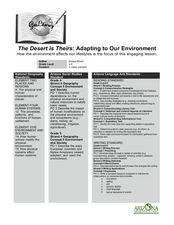TryEngineering
Irrigation Ideas
Students design and build an irrigation system that can move water from one place to another. In this engineering lesson, students test whether their system can move two cups of water to at least three feet from the source. They evaluate...
Curated OER
Geography of Mesopotamia
Students write a letter. In this irrigation lesson, students review how humans and the environment can interact with each other, learn new vocabulary words having to do with Mesopotamia, learn about irrigation and view maps of...
Curated OER
The First Farmers
Students show how constant irrigation, with repeated evaporation of water that left salts in the soil, eventually ruined much farming land in southern Mesopotamia. They discuss the idea that with the development of irrigation people...
Curated OER
To Build a Farm
Students play the role of an agricultural consultant. In groups, they develop ideas for an effective irrigation system for the new farm in Alaska. They report their ideas and findings to the class and complete a budget sheet for their...
University of Wisconsin
Bimodel Botany Bouquet
Gardeners are given an individual plant specimen from a bouquet of local rain garden plants. They group up by their plant type and then make observations together, name the plant, and introduce it to the rest of the class. You then share...
Curated OER
What's Holding Up the Water?
Students read about the history and locate dams in Arizona. In this Arizona dams lesson plan, students write a summary about what they read focusing on word choice, ideas, conventions, and geography content.
Curated OER
Cultural Lit. 26: Anasazi Pueblo: 1050 to 1300 A.D.
Sixth graders study Anasazi Culture through direct instruction and cooperative groups.
Curated OER
The Desert is Theirs: Adapting to Our Environment
Students determine how animals and people adapt to the desert environment. In this desert lesson plan, students review vocabulary about the desert and how humans have to make changes to accommodate their environments. They listen to and...
Curated OER
What Is a Watershed?
Students explore the concept of water pollution. In this environmental stewardship lesson, students discover what watersheds are and consider how to protect them.
Curated OER
Kids for Conservation: Water Conservation Winter
Students rotate through various hands on and critical thinking activites designed to show the amount of water actually used by various people, companies, etc..., and helpful ways of conseving water.
Curated OER
Using Our Natural Resources Wisely
Students understand how ground water can be recycled to maximize its usage and begin to think about ways conservation can help Kansas preserve its natural resources in other areas - soil, minerals, and clean air.
Curated OER
Let's Go To The Movies
Students explore technology used in making movies. In this movie making lesson plan, students investigate how technology has improved in the entertainment industry. Students discover how simple tools are combined together to make complex...
Curated OER
Ancient Mediterranean Lands: Greece
Learners study maps and structures of Ancient Greece and realize how these structures impact times. In this structures lesson plan, students view the structures of how Ancient Greece was put together and discuss how these structures...
Curated OER
Problems Facing Agriculture
Fourth graders examine the conflicts over land ownership and water in the second half of the 1800s in California. They write a criticism about the problems that farmers faced, and work in pairs to define key vocabulary terms.















